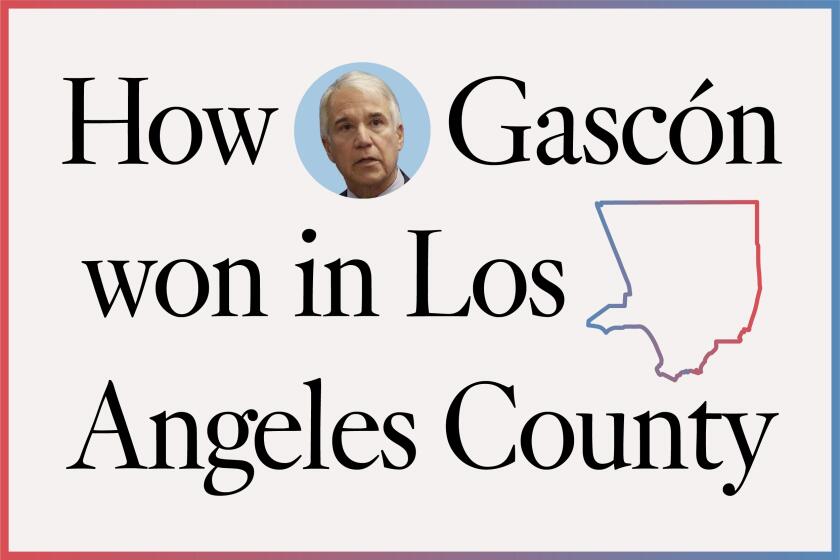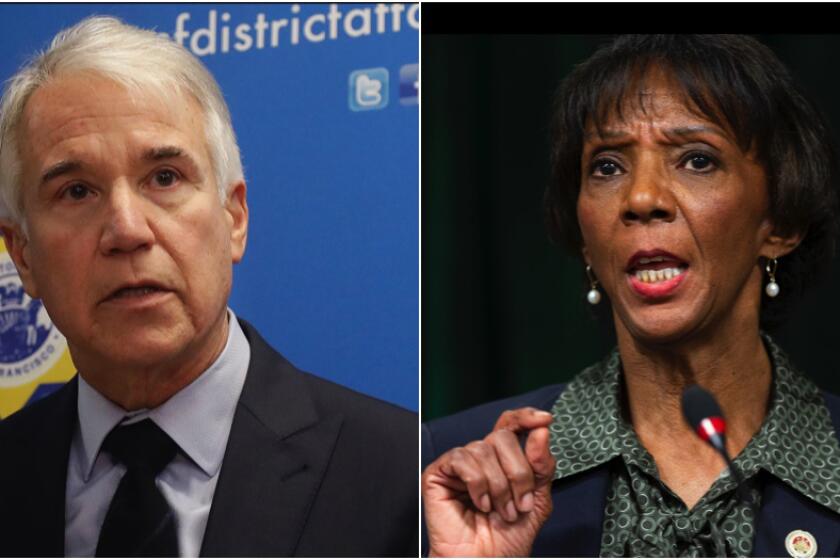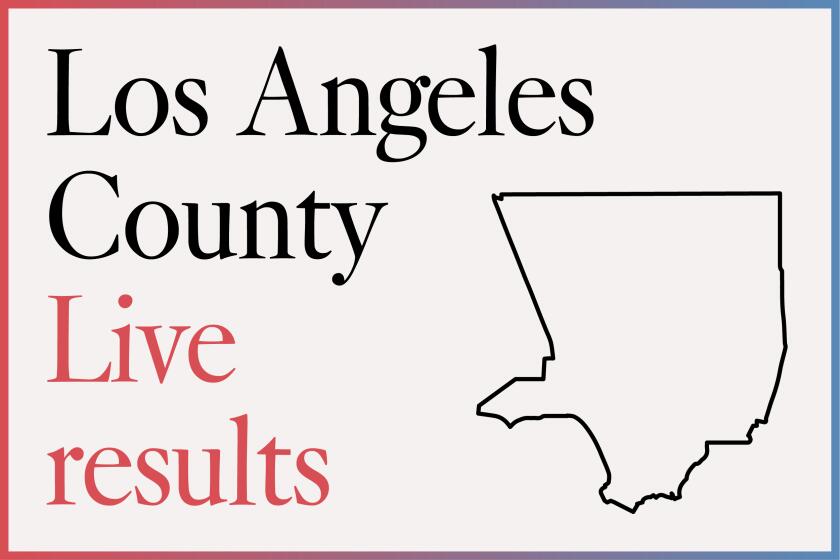George Gascón will be L.A. County’s next district attorney, promises swift changes

Los Angeles County Dist. Atty. Jackie Lacey concedes, clearing way for George Gascón to become head of the largest prosecutor’s office in the nation.
Fresh on the heels of claiming victory Friday in the nationally watched battle to lead the Los Angeles County district attorney’s office, reform challenger George Gascón promised swift changes in criminal justice policies, vowing to stop trying juveniles as adults and prevent prosecutors from seeking the death penalty.
Gascón’s ascension as D.A. in the nation’s largest local prosecutor’s office was a major victory in the movement to elect progressive district attorneys and came after incumbent Jackie Lacey, who had been seeking a third term, conceded the race earlier in the day.
Gascón, 66, is the former district attorney in San Francisco and has had a long career in law enforcement, serving as police chief in San Francisco and Mesa, Ariz., and as an assistant chief in the Los Angeles Police Department.
He jumped out to an early election-night lead that has remained steady as the ballot count continued. Lacey would have needed to win more than two-thirds of the remaining tally to be reelected but instead chose to concede after consulting with her campaign advisers.
“Just one year ago I entered this race. I moved home to be closer to my family. I entered this race because after decades of working to reform safety institutions in Arizona, in San Francisco, I knew doing it here, in my hometown, was the most important place of all,” Gascón said Friday during a virtual news conference.
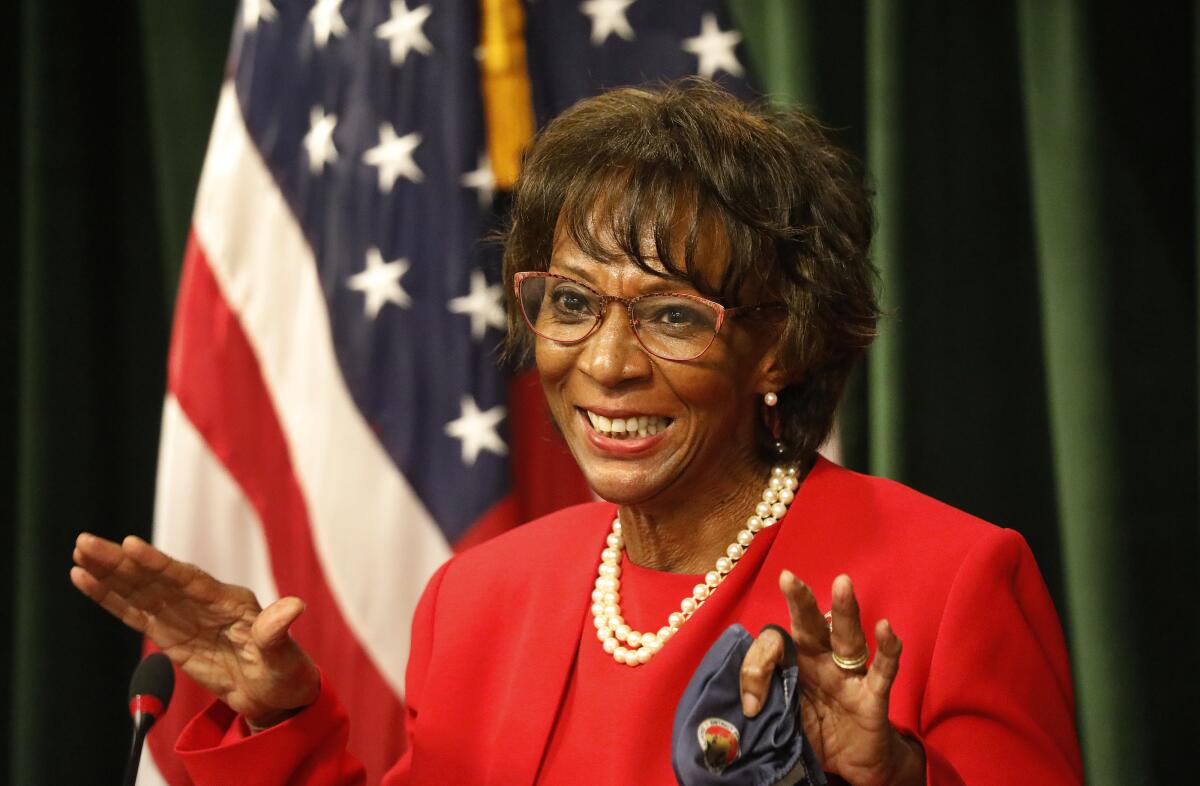
A champion of alternative sentencing measures and reducing mass incarceration, Gascón’s candidacy was met with fierce opposition from law enforcement unions, which cited his lack of trial experience and surging property crime rates in San Francisco under his tenure as disqualifiers of his candidacy. But with the support of L.A.’s burgeoning activist community and a massive fundraising advantage buoyed by hefty donations from progressive mega-donors, Gascón had captured 236,000 more votes than Lacey by the end of the week.
His win marks the biggest victory yet for a nationwide movement that has seen similar candidates win control of prosecutor’s offices in St. Louis, Chicago and Philadelphia.
“We cannot continue to do business as we have for the past 30 years and somehow expect a different result,” he said. “It’s important to recognize that community safety does not travel alone on a singular track.”
Earlier in the day, Lacey heaped praise on her colleagues and recounted gains the office made in combating sex trafficking and advocating for mentally ill defendants during her eight years in office.
She offered a message of unity and called for calm after a contentious race against Gascón. The contest took a number of ugly turns, with Lacey receiving death threats during the primary and facing protesters outside her home on more than one occasion. One incident ended with her husband pointing a gun at unarmed protesters on the family’s doorstep. David Lacey faces three counts of misdemeanor assault in that incident.
“We must work together to make the system better for everyone without demonizing people,” she said during her address at the Hall of Justice in downtown Los Angeles.
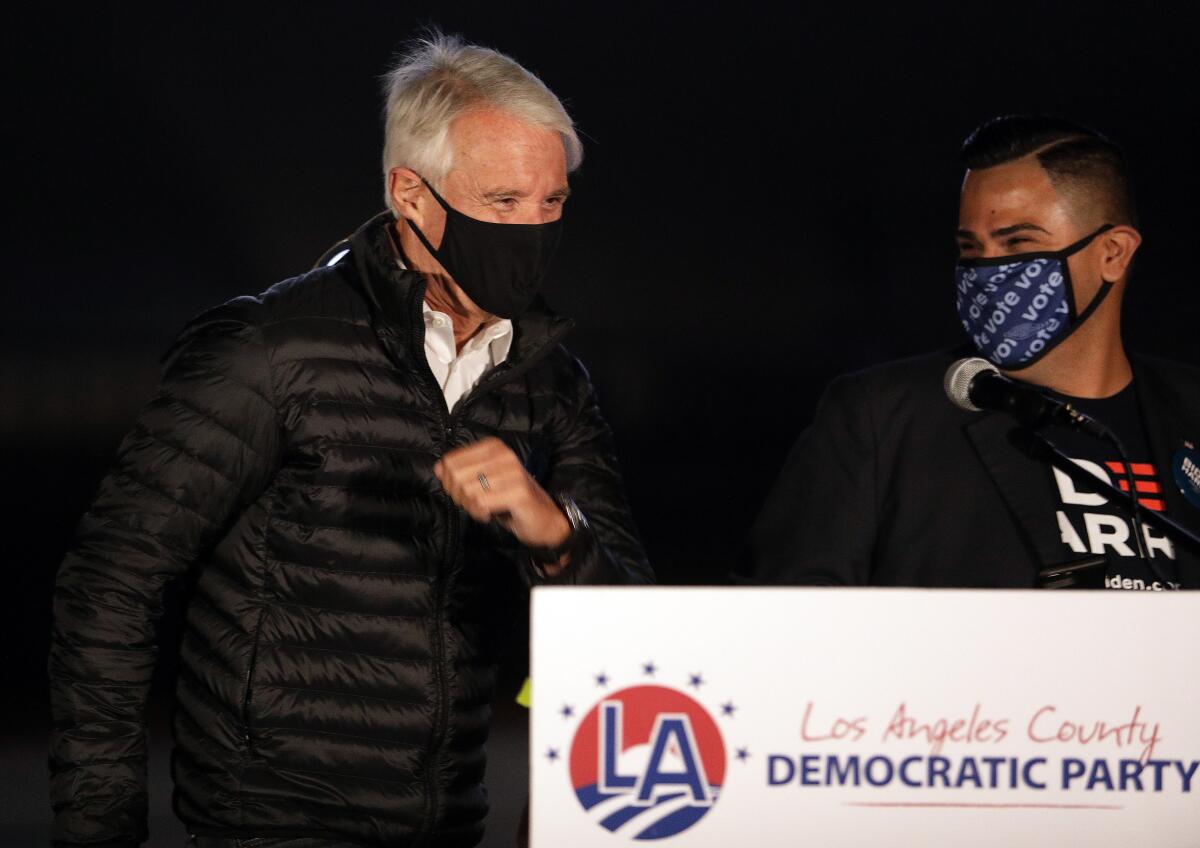
Lacey, 63, nearly won the race in March, claiming 48% of the primary vote, far ahead of Gascón and former public defender Rachel Rossi, but falling short of the majority that would have given her an outright victory. But Gascón, who has long championed alternatives to incarceration for nonviolent and mentally ill defendants, gained momentum throughout the summer during nationwide protests calling for changes to the criminal justice system.
The November contest between Los Angeles County Dist. Atty. Jackie Lacey and former San Francisco Dist. Atty. George Gascón to oversee the nation’s largest prosecutor’s office has been framed as a test of appetites for criminal justice reform.
Ultimately, that wave was enough to topple Lacey, who has been criticized locally for declining to charge police officers in a number of shootings of unarmed men during her eight years in office. Lacey was L.A. County’s first female and first Black district attorney and had served as a deputy district attorney for more than 30 years.
Lacey tried to present herself as a balanced candidate, one who had aggressively prosecuted dangerous criminals while also acknowledging a need to change the way her office handled defendants who were homeless or mentally ill. But opponents repeatedly grilled her record on police shootings, and Lacey acknowledged a summer of unrest over the police killings of George Floyd in Minneapolis and Breonna Taylor in Louisville, Ky., helped fuel her defeat.
“These incidents were painful and exposed an issue that existed in this country for years. Racism. Our nation is going through a reckoning, and what happened in my election may one day be listed as a consequence of that,” she said. “It may be said that one day the result of this election is a result of our season of discontent and a demand to see a tsunami of change.”
A Times analysis of election results shows Lacey’s support in Black neighborhoods slipped between the primary and election. She won 51% of Black-plurality neighborhoods in March but just 42% in November. Her share of the vote in largely liberal Westside enclaves such as Santa Monica and Venice also fell off.
Gascón takes office Dec. 7. His victory could dramatically alter the operations of the district attorney’s office, where he will oversee roughly 1,200 prosecutors who file, on average, more than 100,000 cases each year. In San Francisco, Gascón made frequent use of diversion programs and alternative sentencing methods for defendants accused of nonviolent crimes, juveniles and those suffering from mental illness or drug addiction.
The moves helped lower San Francisco’s jail population during his eight years in office, but some police officials also blamed his policies for driving a historic surge in car break-ins.
During the campaign, Gascón said he would consider reopening investigations into a number of fatal police shootings in which Lacey declined to prosecute officers, including the 2016 killing of Brendon Glenn in Venice Beach. A staunch opponent of the death penalty, he also said he will work to have death row inmates who were convicted in L.A. County re-sentenced to life without parole. Gascón has also promised to expand the use of alternative sentencing courts and pretrial diversion programs for mentally ill defendants in Los Angeles, initiatives Lacey supported but faced criticism for not making broad use of.
Once in office, Gascón will have to find a way to mend fences with a law enforcement establishment that fiercely opposed his candidacy. Unions representing rank-and-file LAPD officers, sheriff’s deputies and deputy district attorneys spent millions in support of Lacey.
In a statement Friday, the Association of Deputy District Attorneys said its members would “remain devoted to carrying out our office’s nonpartisan and apolitical public mission: to protect our communities through the fair and ethical pursuit of justice and to safeguard the rights of crime victims.”
Gascón promised to work closely with those who opposed his election but also asked critics to cease suggesting the decades-long law enforcement veteran’s positions were antithetical to combating crime as well.
“Contrary to most of the rhetoric you’ve heard, I’m a public safety person. I’ve worked my entire life, since very early in my career, to make sure that people were protected,” he said.
